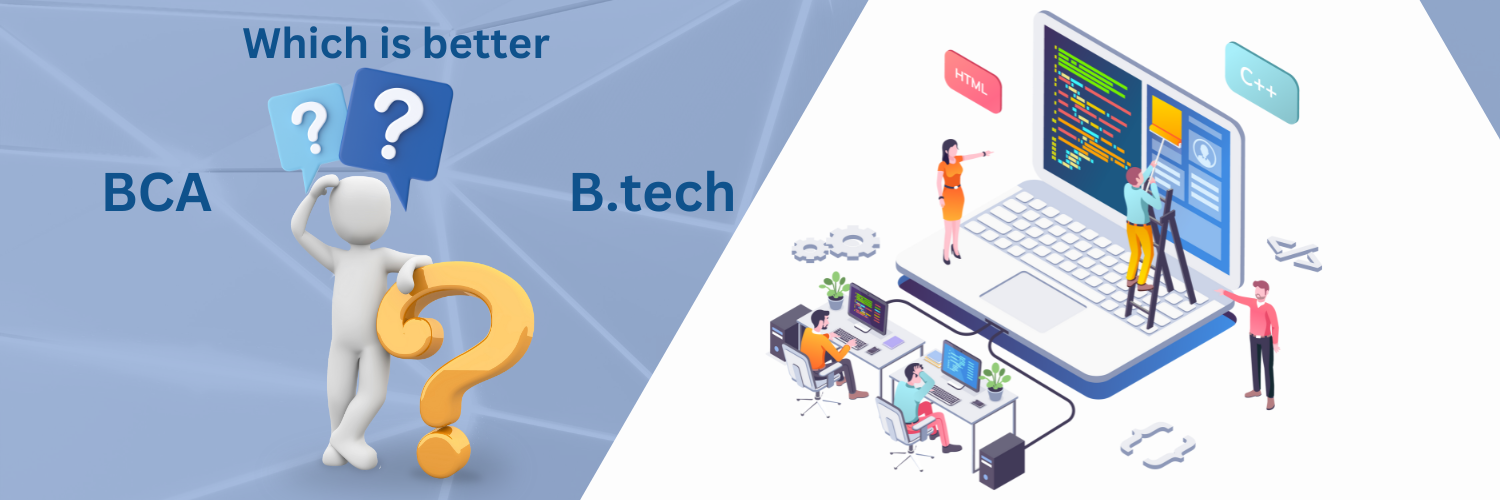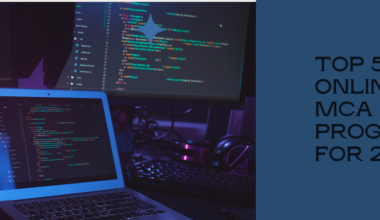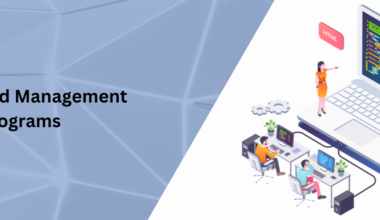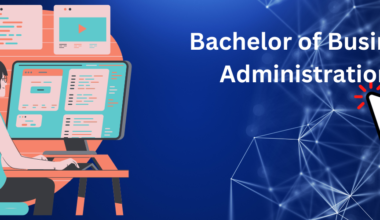Have you always found computers and how they work to be fascinating? You want to pursue a career in this exciting and lucrative field. But you’re stuck at a crossroads: which computer science course should you choose? BCA or B.Tech?
BCA (Bachelor of Computer Applications) and B.Tech (Bachelor of Technology) in Computer Science Engineering are two of the most popular and sought-after computer science courses in India. But they are not the same. They have different eligibility criteria, admission process, course duration, syllabus, benefits, specializations, higher studies, scope, career prospects, and salary.
How do you decide which one is right for you? How do you compare and contrast these two courses and weigh their pros and cons? How do you align your interests and goals with the course that suits you best?
In this blog, we will help you understand the difference between a BCA and a B.Tech. in computer science.
Eligibility
Before choosing a computer science course, it’s important to understand the eligibility requirements. These requirements differ for BCA and B.Tech. programs, which are offered by different types of institutions.
- BCA: To do a BCA, you typically need to have completed your 12th grade from any stream with at least 45–50% marks. While some colleges may ask for math in 11th and 12th grade, it’s not a must for all. You’ll also need to pass an entrance exam held by your chosen college or university.
- B.Tech: For a B.Tech in CSE, you usually need to have finished your 12th grade in the science stream with Physics, Chemistry, and Mathematics (PCM) as compulsory subjects, and you should have at least 50% marks. Additionally, you’ll have to clear an engineering entrance exam like JEE Main, JEE Advanced, BITSAT, and so on.
Admission Process
The way you get into BCA and B.Tech. programs can be different.
- BCA: To get into BCA, you usually have to take an entrance exam. This exam might have questions about math, logic, English, and general knowledge. Your score on this test and your marks from 12th grade help decide if you can join the college or university.
- B.Tech: For B.Tech., it’s a bit more complicated. First, you take a big entrance exam like JEE Main or a state-level one like MHT CET. If you do well, you can move on to the next level, which could be JEE Advanced or BITSAT. These exams are tougher and focus on subjects like physics, chemistry, and math. Your scores on these exams and your 12th-grade marks determine if you can join an engineering college.
Course Duration
The course duration for BCA and B.Tech. is another factor that you need to consider before choosing a computer science course.
- BCA: BCA is a three-year course divided into six parts, with each part lasting six months. You’ll learn about computer applications during this time.
- B.Tech: B. Tech takes four years and has eight parts, each six months long. You’ll be studying computer science and engineering during these years.
Syllabus
The syllabus for BCA and B.Tech. is one of the most important aspects that you need to compare before choosing a computer science course. The syllabus reflects the depth and breadth of the course content and the skills that you will acquire during the course.
- BCA: The syllabus for BCA focuses on various computer applications and programming languages that are used in the industry. Some of the subjects that you will study in BCA are programming in C, data structures, database management systems, object-oriented programming, web development, software engineering, operating systems, Java programming, Python programming, artificial intelligence, and cloud computing.
- B.Tech: The syllabus for B.Tech. covers both the theoretical and practical aspects of computer science engineering. Some of the subjects that you will study in B.Tech. are mathematics, physics, chemistry, engineering mechanics, electrical engineering, electronics engineering, data structures and algorithms, computer organization and architecture, object-oriented programming, database systems, operating systems, computer networks, software engineering, compiler design, artificial intelligence, machine learning, data science, and the Internet of Things.
Benefits of Pursuing
Both BCA and B.Tech have their pros and cons, so let’s break it down.
BCA Benefits:
- BCA is shorter and costs less compared to B.Tech. It’s a three-year course, and it’s budget-friendly.
- BCA is flexible. You can come from any 12th-grade stream, and you don’t need specific subjects like physics, chemistry, or math.
- BCA specializes in computer applications and programming, which are in high demand.
- After BCA, you can go for further studies like MCA or MBA.
B.Tech Benefits:
- B.Tech is prestigious and well-recognized by both industries and universities.
- It’s a comprehensive course covering both software and hardware in computer science.
- You get practical experience with lots of hands-on work, projects, internships, and training.
- After B.Tech, you can pursue advanced studies like M.Tech or MS in India or abroad.
Specialization
Both BCA and B.Tech offer various specializations that you can choose from according to your interests and career goals.
BCA Specializations:
- Software Development: Here, you learn to create software using different programming languages and tools.
- Web Development: This one is about making and designing websites and web apps using things like HTML, CSS, and JavaScript.
- Database Management: You’ll learn how to handle and work with data using database systems like MySQL or Oracle.
- Network Administration: This specialization is about setting up and looking after computer networks using things like TCP/IP, LAN, and WAN.
B.Tech Specializations:
- Computer Science Engineering: This is about creating software systems using various programming languages and algorithms.
- Information Technology: It’s all about using computer science in fields like business, education, healthcare, and more.
- Software Engineering: Here, you learn the principles and practices involved in software development, like design, testing, and maintenance.
- Data Science: This specialization focuses on working with data, like extracting, analyzing, and visualizing it using tools like Python, R, and SQL.
Higher Studies
Both BCA and B.Tech can set you up for more advanced studies that can boost your career and knowledge.
After BCA:
- You can go for an MCA (Master of Computer Applications), which is a two-year program giving you advanced skills in computer applications and programming. It’s as valuable as an M.Tech.
- Another option is an MBA (Master of Business Administration), a two-year program that teaches management skills in areas like finance, marketing, and HR, opening doors for leadership roles.
After B.Tech:
- You can opt for an M.Tech (Master of Technology), a two-year program that dives deep into a specific area of engineering, like computer science, information technology, software engineering, or data science. It’s great for research and development roles.
- There’s also the choice of an MS (Master of Science), another two-year program that delves into specific fields like computer science, information technology, or data science. It’s a popular option for higher education abroad.
Career Prospect
Both BCA and B.Tech. can lead to many job opportunities in the computer science field. Here are some common jobs you can aim for after finishing either of these courses:
- Software Developer: They create, test, and look after software applications using various programming languages and tools.
- Web Developer: Web developers build and manage websites and web apps using things like HTML, CSS, JavaScript, and PHP.
- Database Administrator: Database administrators handle data using systems like MySQL or Oracle.
- Network Engineer: These folks set up and manage computer networks using things like TCP/IP, LAN, and WAN.
- Software Tester: They check software to make sure it works properly using different testing methods and tools.
- Data Analyst: Data analysts collect, analyze, and interpret data using tools like Python, R, and SQL.
- Machine Learning Engineers: These engineers develop and use machine learning models with frameworks like TensorFlow and PyTorch.
- Data Scientist: Data scientists solve complex problems using advanced statistics and computing methods.
Conclusion
Both BCA and B.Tech are fantastic options for computer science enthusiasts. However, it’s essential to weigh their differences in eligibility, admission process, course duration, curriculum, benefits, specializations, higher education prospects, job opportunities, and potential salaries. To make an informed decision and find the best fit for your interests and goals, consider all these factors. Don’t hesitate to seek guidance from teachers, counselors, seniors, or experts, especially when aiming to select the best BCA college in Ghaziabad.






